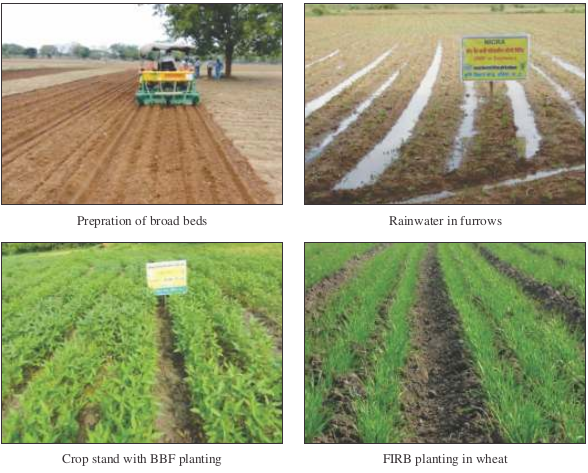Improved planting methods for enhancing water use efficiency and crop productivity
Improved planting methods for enhancing water use efficiency and crop productivity
Climate vulnerability
Extreme rainfall events, prolonged dry spells and waterlogging at different crop growth stages.
Existing practice
Generally farmers of Sanora and Barodi village, Datia sow soybean with local country plough which is time and labour intensive. During extreme rainfall events, the crop gets affected either due to dry spells or waterlogging due to lack of proper drainage.
Resilient practice / technology
There is a need for in-situ soil and water conservation and proper drainage technology in deep black soils. Broad bed and furrow (BBF) system involves preparation of a broad bed of 90 cm, furrow of 45 cm and sowing of crop at a row spacing of 30 cm. The cost of BBF implement is Rs. 45,000. The BBF technology has many advantages including in-situ conservation of rainwater in furrows, better drainage of excess water and proper aeration in the seedbed and root zone. More than 200 farmers in Sanora and Barodi village adopted the technology. Similarly, furrow irrigated raised bed (FIRB) planting was promoted for cultivation of different crops in Uttar Pradesh, West Bengal, Punjab, Maharashtra, Karnataka, Rajasthan and Tamilnadu. Ridge and furrow method of vegetable cultivation was promoted in Gunia village of Gumla district and in cotton at Amravati and Aurangabad, Maharashtra.
Impact
Advantage of BBF planting method :
- Increase in water use efficiency
- Increase in crop productivity (5-10%)
- Less moisture stress during non- rainy days
- Time saving (25-30%) in irrigation
- Requires 20-25% lower seed rate
- Water saving up to 25-30%
- Better weed management
- Reduces crop lodging
Performance of soybean in ridge and furrow method of sowing
| Particular | Ridge and Furrow | Farmers’ practice | % increase in yield/income |
|---|---|---|---|
| Grain yield (kg/ha) | 1937 | 1152 | 40.5 |
| Net Return (Rs/ha) | 38805 | 18898 | 51.3 |
| B:C ratio | 3.51 | 2.41 | |
| Water use efficiency (kg/ha/mm) | 2.09 | 1.24 |

Advantages of FIRB planting method are:
- Management of irrigation water is simpler and more efficient. On an average about 30% less irrigation water was required compared to flat bed method and improved crop yields by more than 20%. FIRB planting saved 30 to 50% wheat seed compared to flat bed planting.
- Better upland crop production is possible under wet spells because of proper drainage.
- Farmers can apply N and irrigation water at grain filling stage to improve protein content without inducing lodging. Reduced lodging can have a significant positive effect on yield as many farmers do not irrigate after heading precisely to avoid lodging.
- Weeds between the beds can be controlled mechanically early in the crop cycle.
- Herbicide dependence is reduced, and hand weeding and hoeing between rows are easier
- Yield of rice transplanted on FIRB was comparable with traditional rice but could save as much as 25-50% in irrigation water.
- Compaction of soil is limited only to the furrows used as tramlines (tractor tracks).
Ridge and furrow method of vegetable cultivation in Gunia village of Gumla district had the following advantages:
- Crop stand improved by 70-75%
- Time saving (25-30%) in irrigation (1.5 hr/ha/irrigation)
- Required 20-25% lower seed rate
- Water saving was up to 25-30%
- Better crop management
- Reduced crop lodging in tomato
- Obtained 10-15% higher yield
Scope for upscaling
BBF / FIRB / Ridge furrow planting of crops was demonstrated in Coochbehar (West Bengal), Kushinagar (U.P.), Baramati, Amravati, Aurangabad, Nandurabar (Maharashtra),Nalgonda (A.P), Kota, (Rajashthan) Datia, Morena, Satna (M.P) Chikballapur (Karnataka) and Villupuram (Tamilnadu) in 412 ha covering over 1000 farmers with an average 10 to 40% increase in yield and benefit cost ratio of 2.2 to 4.7 compared to farmers’ practice. There is scope for upscaling the technology in soybean, maize and wheat growing areas.
Source: Smart Practices and Technologies for Climate Resilient Agriculture
Last Modified : 2/12/2020
This topic provides information about Check dams f...
This topic provides information about Captive rear...
This topic provides information about Crop diversi...
This topic provides information about Community ta...
